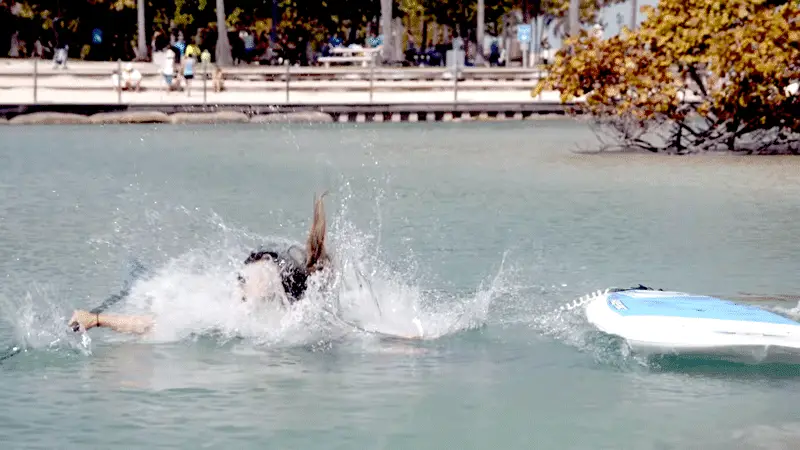Have you ever been out on the water and suddenly found yourself completely off balance?
It’s a common occurrence for those who are just learning to paddleboard.
While there are many different reasons why this might happen, one of the most common is that people tend to focus on their boards instead of looking out at the horizon.
When you do this, it becomes difficult to understand your body’s position in space and anticipate any swell coming in your direction.
To keep from losing balance again, try keeping your head up and eyes looking ahead so that you can have a better understanding of where you’re headed!
[ez-toc]

Is it hard to balance on a paddleboard?
For the most part, balancing on a paddleboard is not too difficult.
However, it can be challenging for some people who are not used to being on a board.
In order to stay balanced, you’ll need to keep your center of gravity over the board by using your core muscles.
If you find yourself losing balance, simply take a step or two in the direction that you want to go and then continue paddling.
It might take a little bit of practice before you feel completely comfortable on your paddleboard, but eventually, you’ll be able to cruise across the water with ease!
Is it harder to balance on an inflatable paddleboard?
The fact that inflatable paddle boards are generally bigger than traditional, rigid ones means it might take more effort to keep them balanced.
However, they also offer better stability for those who are just starting out.
If you find an inflatable board difficult to get used to, try standing near the center of it and using a leash so that if you do lose your balance, you won’t fall off.
In time, you’ll be able to move around more freely on your board and take on bigger waves!
Remember to always use caution when out on the water, and be sure to read up on any safety tips before heading out.
What can I do if I am having difficulty balancing on my paddleboard?
When you’re first learning how to paddleboard, it might be hard to stay on a board for a long time without feeling some discomfort or losing your balance.
There are a few things that you can do in order to improve your balance and make it easier to stay on the board.
First, try practicing in a calm body of water until you feel more comfortable.
Next, make sure that you are using the correct stance for your height and weight.
You can also try sitting down on the board if you’re having trouble standing up.
Last but not least, always wear a life jacket while paddleboarding!
If you do find yourself off balance, take a step or two in the direction you want to go and keep paddling.
The more often you paddleboard, the better your balance will become!
How can I improve my sup balance?
When learning how to paddleboard, it is important to remember that balance is key.
By keeping your head up and looking ahead, you’ll be able to anticipate any waves or swell coming your way and avoid losing balance.
If you’re having trouble staying balanced, try using a paddle leash so that you won’t fall off if you lose your balance.
In time, you’ll be able to move around more freely on your board and take on bigger waves!
Exercise to build balance on a paddleboard
Balance is key when it comes to getting started with paddleboarding.
However, many people find that they are unable to balance on their boards since it’s not easy for everyone to stay upright while standing still.
To build up your balance skills, you can try yoga so that you’ll be able to hold yourself in place while also strengthening your core muscles.
Then, once you feel ready, practice paddling around in calm water so that you can get used to the feeling of moving on top of your board!
You can also try using a balance board for SUP training at home.
Use a longer paddle
When you’re first starting out with paddleboarding, it might be a good idea to use a longer paddle.
This will help you more easily reach the water and keep your balance while paddling.
As you get better at staying on the board, you can try using a shorter paddle so that you’ll have to work a little harder to keep your balance.
Remember to always use caution when out on the water, and be sure to read up on any safety tips before heading out.
Paddleboarding is not only a fun summer activity but also a great workout!
By following these tips, you’ll be able to improve your balance and stay safe while enjoying this popular pastime.
The key to balancing on a paddleboard is learning how your body reacts in different situations. Keep practicing and you’ll get the hang of it!
Final Thoughts
There are a few things that you can do in order to improve your balance and make it easier to stay on the board.
When you’re first learning how to paddleboard, it might be hard to stay on a board for a long time without feeling some discomfort or losing your balance.
There are a few things that you can do in order to improve your balance and make it easier to stay on the board.
First, try practicing in a calm body of water until you feel more comfortable.
Next, make sure that you are using the correct stance for your height and weight.
You can also try sitting down on the board if you’re having trouble standing up.
Last but not least, always wear a life jacket while paddleboarding!
If you do find yourself off balance, take a step or two in the direction you want to go and keep paddling.
The more often you paddleboard, the better your balance will become!
